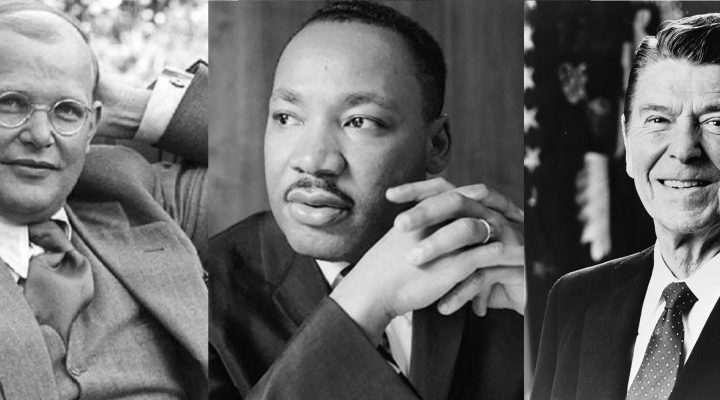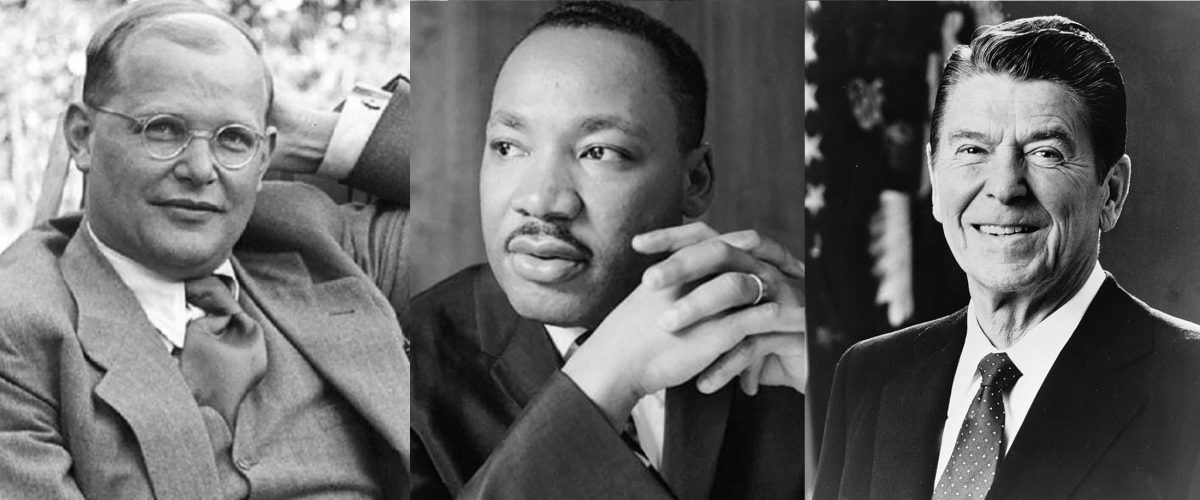Recent letters published by descendants of Dietrich Bonhoeffer and members of the International Bonhoeffer Society denouncing misuse of the German theologian’s legacy illustrate a much bigger problem: The false conversion of iconic people to suit the needs of modern-day conservatives.
It’s not just Bonhoeffer who has been shaped in a new image, it’s also Martin Luther King Jr. and even conservative icon Ronald Reagan.
Think of this as baptism without permission. Conservatives are “baptizing” for their own political purposes people who are not part of the modern conservative movement.
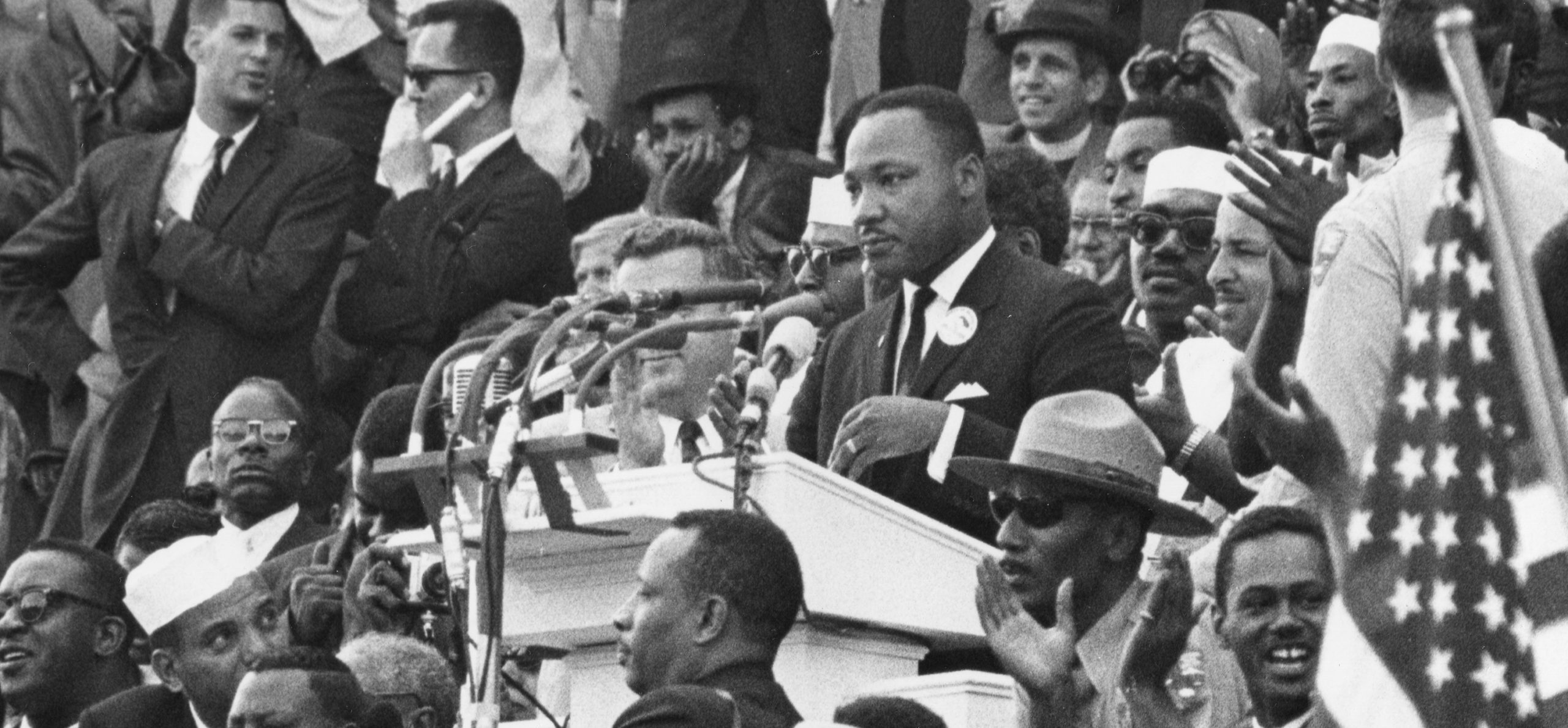
Martin Luther King Jr addresses the crowd on the steps of the Lincoln Memorial during the historic March on Washington. (Photo by PhotoQuest/Getty Images)
Would MLK belong to MAGA?
There are three basic conservative myths about King: That he was a Republican. That he opposed affirmative action. That he grew so radical near the end of his life that he considered renouncing nonviolence.
The Heritage Foundation, producer of Project 2025, now claims King as a fellow conservative. In a 2006 essay titled “Martin Luther King’s Conservative Legacy,” Carolyn. G. Raney argues King’s message was “fundamentally conservative.”
Raney says King’s message was conservative because he believed in a fixed moral law. She quotes from King’s “Letter from Birmingham Jail,” in which King says a just law was “a man-made code that squares with the moral law or the law of God.”
“He was against all policies based on race,” says Peter Schramm, a conservative historian. “The basis of his attack on segregation was ‘judge us by the content of our character, not by the color of our skin.’ That’s a profound moral argument.”
One of the first leaders to invoke King’s message in support of conservative ideas was Ronald Reagan, according to Stephen Prothero in his book The American Bible, which examines the most famous speeches and texts in American history. In June 1985, Reagan cited King’s “content of our character” line from the “I Have a Dream” speech to argue in a speech opposing affirmative action that King’s vision of a colorblind society would not include racial hiring quotas.
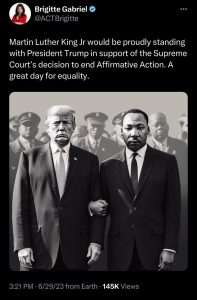 Later, has-been Republican presidential candidate Vivek Ramaswamy suggested King would support banning Critical Race Theory and diversity, equity and inclusion initiatives. Brigitte Gabriel, leader of an anti-Muslim organization called Act for America, tweeted out this AI-generated image of Trump and King embracing one another to celebrate the Supreme Court’s overturning of affirmative action.
Later, has-been Republican presidential candidate Vivek Ramaswamy suggested King would support banning Critical Race Theory and diversity, equity and inclusion initiatives. Brigitte Gabriel, leader of an anti-Muslim organization called Act for America, tweeted out this AI-generated image of Trump and King embracing one another to celebrate the Supreme Court’s overturning of affirmative action.
PragerU, an American nonprofit advocacy group and media organization that creates content promoting conservative and capitalist viewpoints on various political, economic and sociological topics for schools, has a video insisting King would have opposed Black Lives Matter.
Imagining King as a self-help prosperity gospel preacher strains the mind. I have trouble seeing Martin Luther King and Creflo Dollar in the same pulpit. As to being a self-help preacher, King as Joel Osteen fails to register. As Cornel West observes, “How ironic that in America we’ve moved so quickly from Martin Luther King Jr.’s ‘Let Freedom Ring!’ to ‘Bling! Bling!’”
White conservatives attempt to clean our memory of American history. Whether it’s Gov. Ron DeSantis with his “anti-woke” campaign in Florida or the revision of America history by David Barton to wipe out the atrocities of white Americans, we are experiencing what historian Taylor Branch, Pulitzer Prize winning author of Parting the Waters, calls an act of “misremembering.”
On April 4, 1967, King delivered his “Beyond Vietnam” sermon at Riverside Church in New York City. The sermon provoked almost universal outrage.
When King appealed for the children of Vietnam, he made a prophetic gesture that maybe no other preacher would have made: “So they go, primarily women and children and the aged. They watch as we poison their water, as we kill a million acres of their crops. They must weep as the bulldozers roar through their areas preparing to destroy the precious trees. They wander into the hospitals with at least 20 casualties from American firepower for one Vietcong-inflicted injury. So far, we may have killed a million of them, mostly children. They wander into the towns and see thousands of the children, homeless, without clothes, running in packs on the streets like animals. They see the children degraded by our soldiers as they beg for food. They see the children selling their sisters to our soldiers, soliciting for their mothers.”
The New York Times called King’s sermon “wasteful and self-defeating.” The Washington Post titled their editorial coverage of the speech, “A Tragedy.” The Pittsburgh Courier, a leading Black newspaper, said King was “tragically misleading” Black Americans.
PBS talk show host Tavis Smiley reported: “168 major newspapers the next day denounced him.” And the last poll taken in his life by the Harris Poll found nearly three-quarters of the American people had turned against King on this issue, and 55% of his own people had turned against him.
“There’s no getting around King’s commitment to the poor.”
There’s no getting around King’s commitment to the poor. He led a Poor People’s Campaign to Washington, D.C.; he didn’t incite a mob to invade the U.S. Capitol.
King said, “It didn’t cost the nation a penny to open lunch counters. It didn’t cost the nation a penny to give us the right to vote. But it will cost the nation billions to feed and house all of its citizens. The country needs a radical redistribution of wealth.”
King described his economic agenda as “democratic socialism” and called for a “radical redistribution of economic and political power.” In a letter to his wife, Coretta, in 1952, he described himself as “much more socialistic in my economic theory than capitalistic.” The influence of Baptist theologian Walter Rauschenbusch shines brightly in King’s words.
The actual verdict: Martin Luther King Jr. would not be a member of the MAGA evangelical movement today.

Dietrich Bonhoeffer
Would Bonhoeffer support overthrowing democracy?
Author and radio host Eric Metaxas has led the charge in claiming Dietrich Bonhoeffer as a conservative icon. Bonhoeffer was included on the calendar in the Lutheran Book of Worship and was added to the Episcopal calendar in Lesser Feasts and Fasts 1997 and is on the calendar in the Methodist book For All the Saints.

Eric Metaxas and Franklin Graham promote two of Metaxas’ books lionizing Donald Trump.
Metaxas and other conservative Christian supporters of Trump have compared themselves to Bonhoeffer — who was put to death for taking part in a plan to assassinate Adolph Hitler.
Metaxas called the current presidential election a “Bonhoeffer moment” and urged Christians to rise up and oppose “evil” as he defines it.
That evil, in Metaxas’ eyes, is the Democrats, who, he has claimed, stole the 2020 election and whom he often compares to Nazis. For him, if Democrats win this election, it could mean the end of America as we know it. Metaxas has argued in the past that Trump is God’s chosen candidate and that those who oppose him oppose God.
Bonhoeffer was a theologian and anti-Nazi dissident who was executed on orders from Adolf Hitler in April 1945. Today, his life and work are increasingly used to promote political violence and to make false and menacing equations between our present time and the totalitarian Nazi regime. These dangerous narratives are cause for deep concern.
The rhetorical act of claiming Bonhoeffer, an ardent anti-Nazi, as a saint of a group of authoritarian, fascist-leaning American conservatives is a prodigious sleight-of-hand.
A group of Bonhoeffer scholars and members of Bonhoeffer’s family have asked conservatives to stop using Bonhoeffer as one of their inspirations. The scholars wrote: “Christian nationalism uses the symbols and language of Christian faith to gain power and control over others. While it is not unique to the United States, the virulence of American-style Christian nationalism was on full display in 2021, during the January 6 attack on the U.S. Capitol. That day showed that American Christian nationalists do not shy away from violence in their contempt for their political opponents and our democratic institutions.”
In a statement issued Oct. 18, members of the International Bonhoeffer Society called on Metaxas and others to stop comparing the current election to the rise of the Nazis: “Stop misusing Dietrich Bonhoeffer to support political violence and Christian nationalism.”
“There isn’t even a whiff of Bonhoeffer’s pacifism in conservative Christian nationalism.”
The Bonhoeffer Society scholars said, “Dietrich Bonhoeffer did not ask, ‘How far will you go?’ He did not ask, ‘Is this a Bonhoeffer moment?’ Bonhoeffer’s life was defined by the question, ‘Who is Christ for us today?’ Bonhoeffer teaches us that Christ is to be found in the presence and suffering of the neighbor, whether across the street or across the border.”
Stanley Hauerwas observes, “Barth and Bonhoeffer, the most christological theologians of modernity, saw earlier and more clearly than most how the eruption of transcendence exemplified by the Nazis was idolatry.”
Let me state unequivocally: Christian nationalism is idolatry.
There isn’t even a whiff of Bonhoeffer’s pacifism in conservative Christian nationalism. He claimed if our common life rests on lies and injustice, then we cannot hope to be a community of peace. Bonhoeffer had a passionate commitment to the church; Christian nationalism’s loyalty is to secular politics.
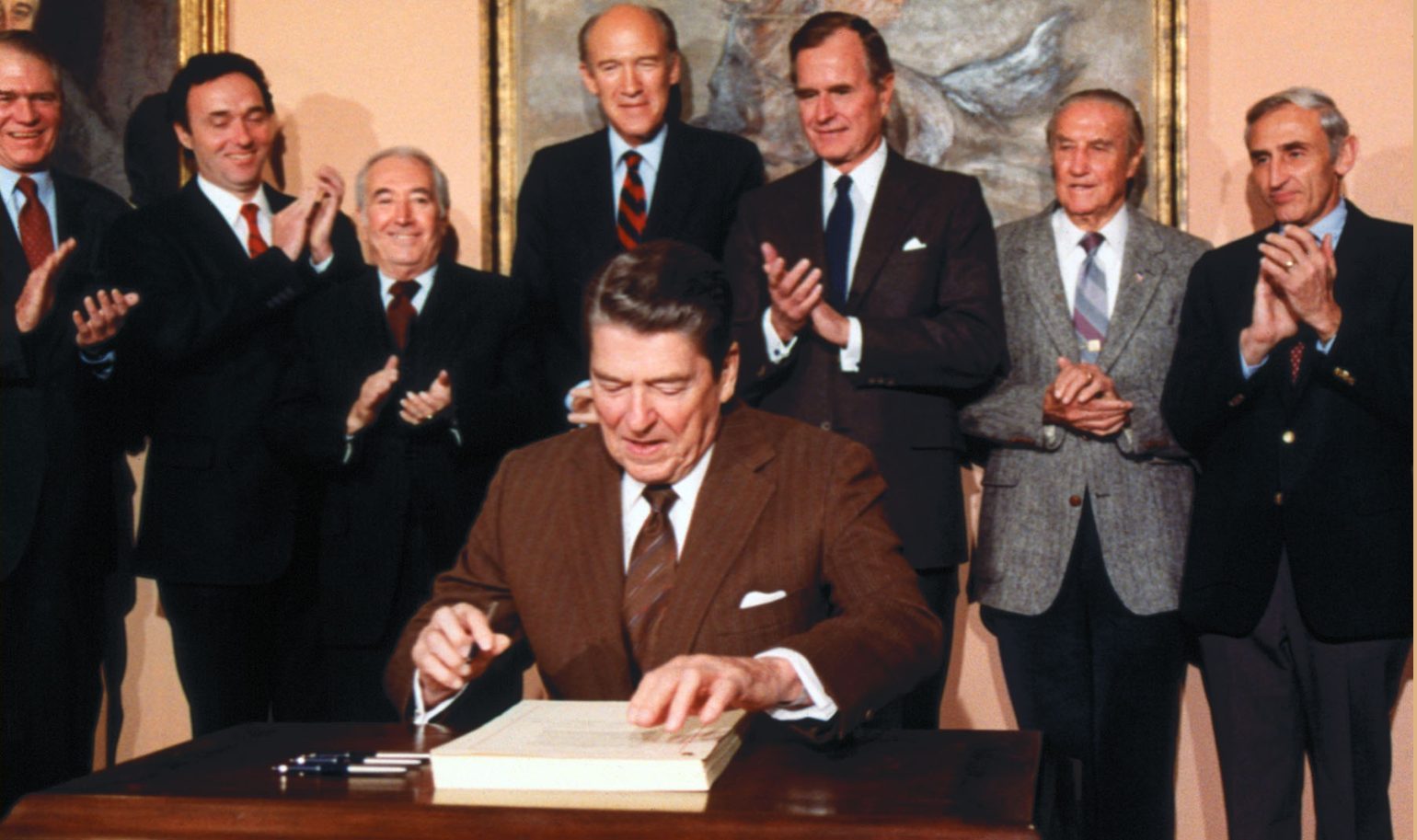
President Ronald Reagan prepares to sign a landmark immigration reform bill at the White House. The bill gave certain illegal aliens a chance of benefits and citizenship and also included sanctions against employers who exploit undocumented workers illegally entering the United States. Behind the President from left are: Rep. Peter Rodino, D-N.J.; Sen. Alan Simpson, R-Wyo.; Vice President George Bush and Sen. Strom Thurmond, R-S.C. (Getty Images)
Would Reagan endorse Trump?
One of the surprising moves of MAGA promoters has been the attempt to claim Trump as the true heir of Reagan.
Daniel McCarthy, editor of Modern Age: A Conservative Review and editor-at-large of The American Conservative, claims Trump delivered for Reagan voters — just as, back in the day, Reagan delivered for the Americans who are now Trump voters.
He enumerates his firm belief that Trump’s get-tough attitude on trade was Reagan’s, too, and both were willing to use tariffs as necessary: Reagan saved Harley-Davidson by hiking tariffs on Japanese motorcycles more than tenfold, from 4.4% to a high of 49.4%.
McCarthy says, “Trump returned America to the Reagan principle of peace through strength in foreign policy — while Joe Biden and Kamala Harris have unleashed chaos on a scale reminiscent of the Carter administration, when Iran seized American hostages and the Soviet Union invaded Afghanistan.”
He ignores the basic difference between Trump’s boasting “tough guy” persona and actual foreign policy as exercised by Reagan.

Israeli Prime Minister Menachem Begin stands with President Ronald Reagan. Begin was awarded the Nobel Peace Prize For his role In negotiations that resulted In the signing of a peace treaty between Israel and Egypt In 1978. (Photo By Dirck Halstead/Getty Images)
McCarthy admits Trump doesn’t rank as high as Reagan as a public speaker but insists he’s like Reagan in his willingness to engage in daring diplomacy — as Reagan did with Mikhail Gorbachev — and also like him in boldly changing the way Americans think about our most dangerous rival.
Even though Reagan was anti-communist and anti-Soviet Union, Trump praises Vladimir Putin.
MAGA contends the future of all Reagan secured for the country back then now hinges on what happens in this election between a Republican who overall continues the Reagan legacy and a Democrat who wants the memory of Reagan’s America to go the way of the Soviet Union.
Is McCarthy’s claim a truthful and verifiable one? Perhaps Reagan’s most lasting achievement was giving Republicans a conservative vision. No moderate candidate received the Republican nomination after Reagan’s administration. By the 2016 election cycle, there were no moderate Republican candidates at all.
Reagan’s legacy showed cracks in its infrastructure. Dana Milbank traces the fragmenting of the Republican Party to 1994 and the rise of Newt Gingrich, the “bomb-thrower” who “set a course toward the ruinous politics of today.”
By 2010, Tea Party Republicans were able to gain power; three years later they brought the government to a halt. The Reagan vision of “compassionate conservatism” dissipated into an authoritarian power destroying truth, decency, national unity, racial progress, their own party and endangering democracy.
In the 2016 campaign between Trump and Hillary Clinton, Reagan’s so-called “11th commandment” faced daily disobedience. That commandment: “Thou shall not speak ill of other Republicans.”
The ill-will and rancor added up as Trump invented his “nicknaming” game. Candidates attacked one another in personal, petty and childish ways. Jeb Bush called Trump “the chaos candidate.” Trump nicknamed Bush as “Low Energy Jeb.” Marco Rubio stooped to genital jokes about Trump; and Trump branded him as “Little Marco.”
“Trump’s politics are nothing like Reagan’s.”
Trump’s politics are nothing like Reagan’s. He is a transgressive bad boy unlike any other politician. While Reagan was “the great communicator,” Trump defies all decorum and decency and tradition. He communicates not through sustained reason but with hyperbole, incoherent claims, racism, anti-Muslim rants, anti-immigrant screeds, and threats. His 2016 election was the end of the Reagan vision of conservatism.
Trump made it “midnight in America,” a direct contrast to Reagan’s “morning in America.
Instead of an optimistic, bright future, Trump paints a dark and apocalyptic scene of destruction and demolition. He wields resentment, fear and anger as weapons. He engages in the populist paranoid rhetoric of McCarthy and Buchanan.
Rhetorical scholar Craig R. Smith notes Trump’s style has “distinct rhetorical markets that included hateful, misogynistic and bellicose bar talk, braggadocio and branding.”
The conservative cause within the secular realm of politics now depends on emotions. The impact of emotions leads easily to demagoguery and manipulation of ideas and people.
In reality, conservatives will need to make their way without King, Bonhoeffer and Reagan. King would be marching against the MAGA movement. Bonhoeffer would view MAGA Christians being as misguided as the Nazi-loving German church. And Reagan — he couldn’t get a majority vote in a Republican primary today.
Rodney W. Kennedy is a pastor and writer in New York state. He is the author of 11 books, including his latest, Dancing with Metaphors in the Pulpit.
Related articles:
Bonhoeffer family and scholars warn against Metaxas and Christian nationalists
Bonhoeffer’s true vision with the growing threats to immigrant populations | Opinion by Will McCorkle
Sarah Huckabee Sanders is wrong about Martin Luther King and affirmative action | Opinion by Wendell Griffen
New film resurrects an old question: What kind of Christian was Reagan? | Analysis by Rodney Kennedy

